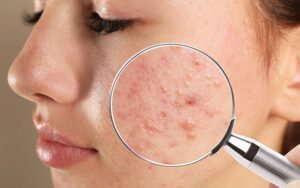To keep healthy skin, a delicate balance needs to be maintained; when this equilibrium is thrown off, several skin issues can surface. One widespread myth is that oily skin and acne are exclusively associated. On the other hand, dry skin may also be to blame for acne outbreaks. In this post, we’ll look at the link between dry skin and acne and how to properly treat acne brought on by dry skin.
What Dry Skin-Related Acne Looks Like:
Despite what the general public believes, dry skin can exacerbate acne in many ways. When the skin is not properly hydrated, it produces extra oil to compensate for moisture loss. Dead skin cells and excess oil have the potential to block pores and foster the growth of acne-causing bacteria. Dry skin-related acne frequently manifests as the following:
Flakiness and redness:
Dry skin is more likely to be flaky and red, and acne can worsen both conditions. On dry skin, pimples may be encircled by red, irritated areas, leaving the face looking uneven and inflammatory.
Enhanced Sensitivity:
People with dry skin are often more sensitive, and breakouts from acne can exacerbate this sensitivity. The skin around the zits may feel constricted and painful, and the zits may be tender.
Fine Lines and Wrinkles:
The premature onset of fine lines and wrinkles is linked to dry skin. Since dry skin struggles to retain its natural moisture balance and suppleness, acne can exacerbate these indications of aging.

How to Handle Dry Skin-Related Acne:
To effectively manage acne brought on by dry skin, one must holistically address both the acne and the underlying dryness. Utilize the following advice to treat acne on dry skin:
Hydrate from Within:
Ensure you consume enough water throughout the day to properly hydrate. Staying hydrated can lessen the effects of dryness and enhance the skin’s general health.
Light Cleaning:
To cleanse your skin, use a gentle cleanser to hydrate it; avoid harsh or drying products. Strong cleansers can remove natural oils from the skin, making it more dry and aggravating acne.
Moisturise Often:
Use a moisturizer that isn’t comedogenic as part of your regular skincare regimen. This keeps the moisture balance of the skin intact without blocking pores. Seek out items with glycerin or hyaluronic acid as an ingredient.
In summary:
Creating a skincare regimen that works requires understanding the link between dry skin and acne. People can attain a more balanced and healthy complexion by treating the signs and symptoms of dryness and acne. To prevent dryness and acne, prioritize hydration, select appropriate skincare products, and follow a routine.